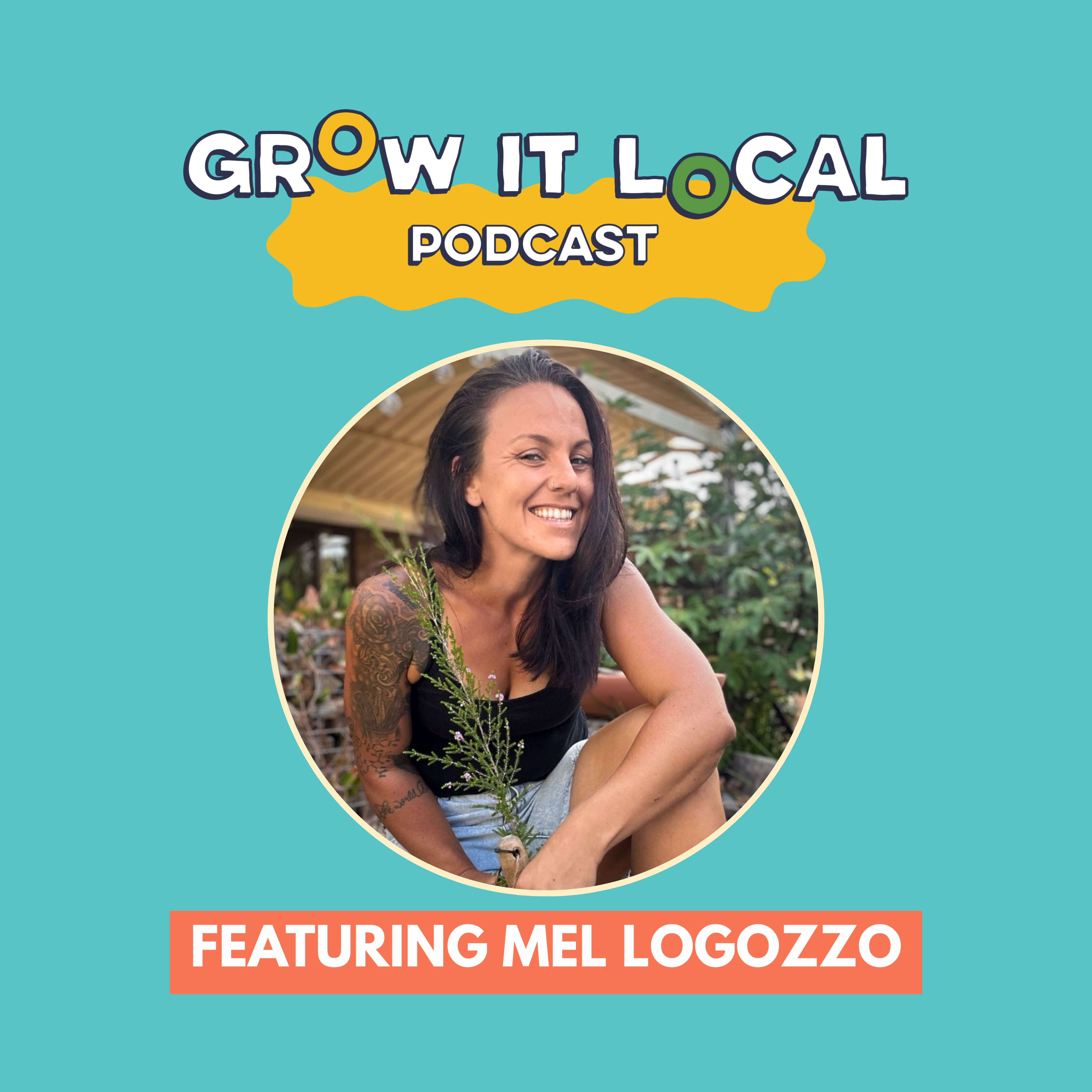Ep 3 - Rewild your patch with Mel Logozzo
- Author
- Grow It Local
- Published
- Wed 27 Aug 2025
- Episode Link
- http://sites.libsyn.com/585945/ep-3-rewild-your-patch-with-mel-logozzo
What happens when you stop trying to control your garden and instead invite nature to take the lead? In this episode, your host Paul West is joined by rewilding champion and bug-loving gardener Mel Logozzo about how to transform any space — from a tiny yard to a sprawling verge — into a thriving habitat.
Mel shares her journey from paved-over suburbia to a lush, biodiverse sanctuary filled with buzzing bees, flowering natives, predatory insects, frogs, and yes… even aphids (on purpose!). Whether you're keen to grow food spray-free, attract more pollinators, or just be a lazier gardener, this episode is packed with insights into rewilding your garden for both productivity and biodiversity.
🧭 In This Episode
-
What rewilding your patch really means
-
How to create a balanced backyard ecosystem (even in small spaces)
-
Why more pests = more predators (and why that’s a good thing)
-
Practical ways to bring in more native insects, birds, and frogs
-
Layering your garden like a food forest — natives and edibles together
-
The role of invertebrates as ecosystem indicators
-
How Mel grows food without using a single spray
-
Why dead plants and weedy corners are ecological goldmines
-
Creating habitat: logs, ponds, bug hotels, and bare soil
-
Why you don’t need to freak out when aphids arrive
💡 Top Tips from Mel
-
“You can’t have predators if you don’t have pests.”
-
“Rewilding is lazy gardening — the less you do, the better.”
-
“Not all sprays are created equal — even organic ones disrupt balance.”
-
“Diversity = resilience. The more life you invite, the less work you’ll have to do.”
-
“Don’t rip everything out! Even dead plants are habitat.”
🛠️ Practical Rewilding Ideas
Element
Rewilding Tip
Trees
Plant large natives like eucalypts to feed and shelter wildlife.
Flowers
Grow a mix of flat, tall, humble, and daisy-shaped blooms for year-round pollination.
Habitat
Add logs, ponds, bug hotels, or just leave a weedy patch alone.
Soil
Avoid mulching every inch — ground-nesting bees and insects need bare soil too.
Ponds
Even a repurposed bath or pot can attract frogs, dragonflies, and mosquito eaters.
Veggie Patch
Let some things flower and go to seed. It's free food for insects.
🐞 Mel’s Rewilding Essentials
-
Don’t spray – not even organic solutions like neem or soapy water. They harm beneficial bugs too.
-
Plant densely – fill every space with something. More layers = more habitat.
-
Observe first – don’t assume a bug is bad. Learn what it is and how it fits into your ecosystem.
-
Build balance over time – your predators may not show up this week, but they will.
-
Work with your soil – raise veggie beds if needed, but leave other areas wild and untouched.
🐝 Mel’s Favourite Insects
Mel is a self-confessed invertebrate nerd. She champions:
-
Aphids (yes, really — they feed the good guys)
-
Blue banded bees and their cheeky parasite, the cuckoo bee
-
Dragonflies, solitary wasps, and parasitoid flies
-
Ground-nesting native bees (70–80% of native bees nest in the soil!)
-
Spiders (passive predators that keep everything in check)
"There’s no such thing as friend or foe — it’s all about balance."
🗣️ Listener Q&A Highlights
-
How do I get rid of cooch grass? → Persistence and deep digging
-
What’s the best path material for rewilded gardens? → Lawn, mulch, logs — whatever fits your climate and feet
-
Where can I learn more about bugs? → Try iNaturalist, Facebook insect groups, or Dennis Crawford’s books
-
What about spider mites? → Let ladybirds and tiny native predators do their thing
-
Can you buy beneficial insects? → Yes, but Mel prefers to let nature handle it
-
How densely should I plant? → Dense! Think nine plants per square metre — or more
📚 Resources & Mentions
-
RewildingSuburbia.com – Mel’s website
-
iNaturalist.org – for plant and insect identification
-
Your local council’s flora/fauna surveys and native plant lists
-
Dennis Crawford’s books and resources on Australian garden insects
If this episode fired you up to garden a little wilder:
-
🐝 Follow Mel on Instagram @rewildingsuburbia
-
🌿 Leave some aphids on your plants and watch what shows up
-
🧑🌾 Subscribe to the podcast for more grow-at-home inspiration
-
📬 Join our newsletter for seasonal tips, community workshops, and more
Thanks to our Sponsors:
This podcast was made with the incredible support of our Local Government partners from around Australia as well as our friends at Backyard Farmer, Pope and Cyclone Tools
